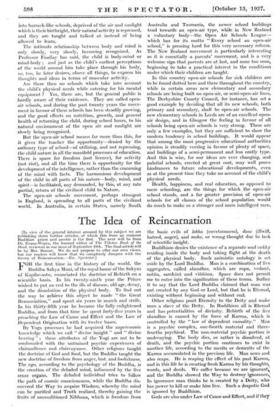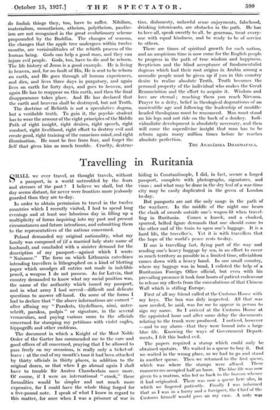The Idea of Reincarnation
[In view of the general interest aroused by this subject we are publishing three further articles, of which this from an eminent Buddhist priest and ascetic is the first. The next will be from Dr. Evans-Wentz, the learned editor of The Tibetan Book of the Dead, reviewed in our issue of September 10th. The fuial article will be by Mrs. Besant. We do not propose to offer our own views, but our readers will know that we completely disagree with the theory of Reincarnation.—En. Spectator.] FOR the first time in the history of the world, the Buddha Sakya Muni, of the royal house of the Sakyas of Kapilavastu, enunciated the doctrine of Rebirth on a scientific basis. In his twenty-ninth year the Prince wished to put an end to the ills of disease, old age, decay, and the dissolution of the physical body. To find out the way to achieve this object he made " the Great Renunciation," and spent six years in search and strife. In his thirty-fifth year he became the fully enlightened Buddha, arid from that time he spent forty-five years in preaching the Law of Cause and Effect and the Law of Dependent Origination with its twelve bases.
By Yoga processes he had acquired the supercegmic knowledge which we call " divine insight" and " divine hearing " ; these attributes of the Yogi are not to be confounded with the untrained psychic experiences of clairaudience and clairvoyance. Other religions taught the doctrine of God and Soul, but the Buddha taught the new doctrine of freedom from anger, lust, and foolishness. The ego, according to the psychology of the Buddha, is the creation of the deluded mind, influenced by the five sense organs. The deluded individual tries to follow the path of cosmic consciousness, while the Buddha dis- covered the Way to acquire Wisdom, whereby the mind can be purified and Truth realized, thereby gaining the fruits of unconditioned Nibbana, *Mar is freedom from the basic evils of lobha (covetousness), dosa (illwill, hatred, anger), and moha, or wrong thought due to lack of scientific• insight.
Buddhism denies the existence of a separate soul entity residing inside the body and taking flight at the death of the physical body. Such animistic ontology. is set aside by the Lord Buddha. Man is a combination of five aggregates, called skandhas, which are rupa, vedanfi, sarTha, samkfira and viiiiidna. Space does not permit me to enter into the signification of these terms. Suffice it to say that the Lord Buddha claimed that man was not created by any God or Lord, but that he is Eternal, existing without beginning and without end.
Other religions posit Eternity to the Deity and make man a slave of the Deity. In Buddhism all is Eternal and has potentialities of divinity. Rebirth of the five skandhas is caused by the force of Karma, which is controlled by the " law of dependent causality." Man is a psychic complex, one-fOurth material and three- fourths psychical. The non-material psychic portion is undecaying. The body dies, or rather is dissolved, at death, and the psychic portion continues to exist in another life, according to the merits or demerits of the Karma accumulated in the previous life. Man sows and also reaps. He is reaping the effect of his past Karma4 and in this life he is creating fresh Karma by his thoughts, words, and deeds. We suffer because we are ignorant and the Buddha showed the Way to destroy ignorance. In ignorance man thinks he is created by a Deity, who has power to kill or make him live. Such a despotic God is ignored by Buddhism.
Gods are also-under Law of Cause and-Effect; and if they do foolish things they, too, have to suffer. Nihilism, materialism, monotheism, atheism, polytheism, panthe- ' ism are not recognized in the great evolutionary scheme propounded by the Buddha. The changes of seasons, the changes that the apple tree undergoes within twelve months, are verisimilitudes of the rebirth process of the human being. Gods can help a good man, and they can injure evil people. Gods, too, have to die and be reborn. The life history of Jesus is a good example. He is living in heaven, and, for no fault of His, He is sent to be reborn on earth, and He goes through all human experiences, and dies, and lives three days in purgatory, and again lives on earth for forty days, and goes to heaven, and again He has to reappear on this earth, and then the final disappearance takes place. And He has declared that the earth and heavens shall be destroyed, but not Truth.
The doctrine of Rebirth is not a speculative dogma, but a verifiable truth. To gain it, the psychic student has to wear the armour of the eight principles of the Middle Path of right insight, right desires, right speech, right conduct, right livelihood, right effort to destroy evil and create good, right training of the conscious mind, and right illumination.. He must be free from fear, and forget the Self that gives him so much trouble. Cruelty, destruc- - tion, dishonesty, unlawful sense enjoyments, falsehood, drinking intoxicants, are obstacles in the path. He has to love all, speak sweetly to all, be generous, treat every- one with equal kindness, and be ready to be of service to others.
• -There are times of spiritual growth for each nation, and an auspicious time is now come for the English people to progress in the path of true wisdom and happiness. Scepticism and the blind acceptance of fundamentalist dogmas which had their root origins in Arabia among a nomadic people must be given up if you in this . country desire to realize absolute Truth. Truth becomes the personal property of the individual who makes the Great Renunciation and the effort to acquire it. Wisdom and love are eternal ; reaching them you reach Nirvana. -Prayer to a deity, belief in theological dogmatisms of an unscientific age and following the leadership of muddle- headed theologians must be renounced. Man must stand on his legs and not ride on the back of a donkey. Indi- vidualistic development is absolutely necessary, and then will come the superdivine insight that man has to be reborn again many million times before he reaches absolute perfection.
THE ANAGEIHKA DHARMAPALA.



















































 Previous page
Previous page